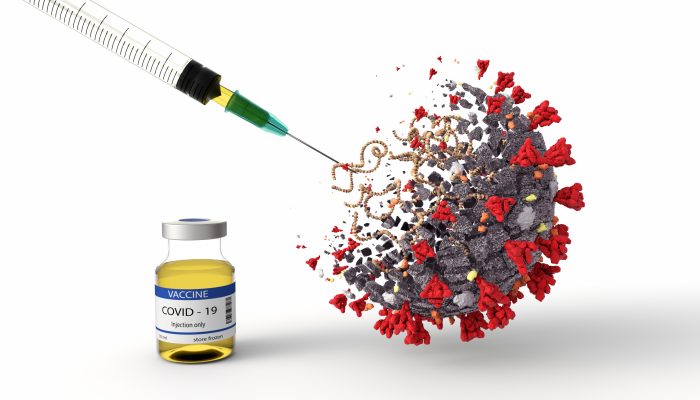
By Mohammed Sinan Siyech*
With the approval and distribution of Covid-19 vaccines at the end of 2020, media channels have been ripe with images of different world leaders such as Singaporean Prime Minister Lee Hsein Loong and US President Joe Biden, among others, either taking the jab, or announcing their intention to do so, in a bid to assuage any public distrust towards vaccines.
Millions of people will likely take the vaccine in 2021, in the hopes of stamping out the threat of Covid-19. However, hardcore anti-vaxxers, as well as a significant segment of the population who distrust vaccines, have been quick to air their opposition to the current vaccination drive. Anti-vaxxers make up a significant 20% of the global population (using random sampling methods) with countries such as France and Ukraine seeing as high as 55% of its populations opposed to vaccinations. Against this backdrop, it is interesting to examine if and how terrorist groups oppose vaccines and what other implications arise out of their position on vaccines.
Past Opposition
Opposition to polio vaccination drives in Nigeria, Pakistan and Afghanistan is the reason why these are the only three nations in the world still witnessing polio outbreaks. Interestingly enough, these countries also have a substantial presence of terrorist groups with Boko Haram reigning supreme in Nigeria, and the Taliban and the Islamic State controlling many parts of Afghanistan and border areas of Pakistan.
Opposition to polio vaccines in these nations stem from three main reasons: First, is the (misplaced) fear that the vaccines contain pig gelatin, which Muslims do not consume. Second, is the myth that polio vaccines cause infertility (all three countries) and bone injuries (Nigeria only) and thus, is a western strategy to target Muslims. Part of this fear is due to vaccine distributors once donning the same jackets as family planners. Third, is the idea that polio workers with their access to different remote villages can be effective spies for western nations trying to eliminate terrorist groups. This last point was given major credence due to a fake Hepatitis vaccination campaign launched by the CIA in 2011 as part of the manhunt for Osama Bin Laden.
The opposition has been so great that health workers have been harassed and killed in all three nations. Moreover, polio keeps resurging in these nations, which exacerbates the challenges in stopping the spread of Covid-19. For instance, polio is a disease that spreads due to poor sanitary conditions. With Covid-19 able to spread quickly in relatively cleaner conditions, it is likely that places where terrorist groups do not allow vaccinations can end up spreading the disease across the region (and even other parts) due to the more transmissible nature of Covid-19.
Overcoming Challenges
However, there is also a difference between the two diseases and vaccination drives for Covid-19. For example, virtually all terrorist groups have taken Covid-19 very seriously, with the Islamic State cautioning its fighters from travelling to Europe while also publishing guidelines on how to deal with the disease in their propaganda outlets. Even Taliban members, who were anti-polio vaxxers were seen distributing sanitizer and working to maintain social distance in areas it controls.
It would be highly counterintuitive that terrorist groups would take the virus so seriously but refuse to administer vaccines in areas that they control. Refusing to do so would render them tactically weaker due to their own members contracting the virus and populations under their control rebelling against them over poor medical conditions. Observers should also note that despite the Islamic State’s affiliates in Nigeria (Boko Haram) and in Afghanistan (Islamic State Khorasan) refusing to administer or facilitate vaccination drives, its branches in Syria have not just allowed for drives, but even vaccinated their own children from polio. This should be kept in mind while devising a plan to roll out Covid-19 vaccines in areas where IS is in control.
When confronting opposition to vaccinations over religious concerns (such as pig ingredients), it would be useful to engage with clerics to dispel such myths, as was done in the case of Afghanistan. While liberal observers may scoff at such ostensibly minute issues, these are very real concerns, that not just these groups, but also Muslims across the world have, thus compelling many imams and clerics across the world to ‘halal’ certify such vaccines. To legitimize Covid-19 vaccinations, it is important to find the right local religious authority to do so. To eliminate fears surrounding infertility and other side effects, it also helps if local and national leaders are seen taking the vaccine.
Lastly, in order address concerns of spying, it would be beneficial to carry out vaccinations in public spaces such as mosques or hospitals, as opposed to private residences. Additionally, terrorist groups themselves can appoint their own people to administer the vaccines. While both measures can shift attention from counter-terrorism operations, the threat of Covid-19 spreading and paralyzing the world for a second consecutive year should be enough reason for governments to suspend such operations for the time being.
Conclusion
In conclusion, it is likely that terrorist groups will facilitate vaccination drives in their territories despite a past opposition to similar campaigns. While this piece does not address it, there are concerns that vaccination storage centers could possibility be targeted. These questions are valid, and adequate protection should be provided to vaccine centers. However, it is also possible that terrorist groups will avoid such attacks for the same reason that they will facilitate Covid-19 vaccinations i.e., their desire to gain more recruits and credibility over time.
* A doctoral candidate at the Islamic and Middle East Studies Department at the University of Edinburgh and senior analyst with the International Centre for Political Violence and Terrorism Research
